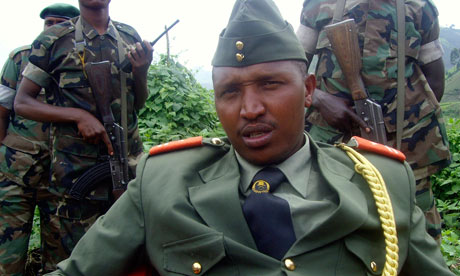On Thursday, International Criminal Court (ICC) judges handed down the highest penalty ever given by the court when they announced a 30-year prison sentence for former Congolese rebel commander Bosco Ntaganda.
The 45-year-old Ntaganda has spent six and a half years in ICC detention, which will be deducted from the years that he will serve. The former chief of general staff of the Patriotic Forces for the Liberation of Congo (FPLC) surrendered to the court in March 2013, seven years after the initial warrant for his arrest had been issued.
The highest sentences for individual crimes were for murder and attempted murder (30 years) and persecution (30 years). Others were rape of civilians (28 years); conscripting, enlisting, and using children in armed conflict (18 years); rape of female child soldiers (17 years); destroying the adversary’s property (15 years); sexual slavery of female child soldiers (14 years); and intentionally directing attacks against civilians (14 years).
Delivering the sentence, Judge Robert Fremr (presiding) noted that when a person has been convicted of more than one crime, the total period of imprisonment shall not be less than the highest individual sentence pronounced. Accordingly, Ntaganda would serve 30 years in prison. Judge Fremr added that the chamber had determined that although Ntaganda’s crimes were of high gravity, they did not warrant a sentence of life in prison as suggested by a lawyer for victims.
Article 77 of the Rome Statute provides for imprisonment for a period not exceeding 30 years, or life imprisonment when justified by the extreme gravity of the crime and the individual circumstances of the convicted person. In addition, judges can issue a fine or order forfeiture of proceeds, property, and assets derived from a convicted person’s crime. Judges determined that a fine was not appropriate because Ntaganda is insolvent.
Former FPLC commander-in-chief Thomas Lubanga is currently serving a 14-year prison sentence, the longest penalty previously issued by the ICC. Another former Congolese militia leader, German Katanga, was sentenced to 12 years, while Malian militant Ahmed Al Faqi Al Mahdi is serving a nine-year jail term.
Ntaganda was convicted over crimes committed during an internal armed conflict in the Ituri region of eastern Democratic Republic of the Congo (DRC) in 2002 and 2003. Trial Chamber VI, which is composed of judges Fremr, Kuniko Ozaki, and Chang-ho Chung, noted in Thursday’s ruling that Ntaganda bore high culpability, as he gave orders to commit crimes and personally engaged in violent conduct. The judges recalled that he was convicted of the murder of at least 74 individuals, including as a direct perpetrator in the killing of a priest.
According to the sentencing judgment, Ntaganda and fellow perpetrators had a plan to drive out members of the Lendu ethnic community from certain localities of Ituri, to kill civilians, steal their property, and subject them to rape and sexual slavery.
Ntaganda was convicted, among others, for sexual slavery and rape, including of child soldiers who served within the FPLC. The sentencing judgment notes that civilian victims of rape and sexual slavery suffered physical, psychological, psychiatric, and social consequences, such as ostracization, stigmatization, and social rejection, both in the immediate and longer term.
Describing the gravity of these crimes and their long-lasting impact, the judgment added that two FPLC child soldiers were raped multiple times by multiple soldiers over the period of their sexual enslavement. They similarly suffered physical and psychological consequences, including sexually-transmitted diseases and unwanted pregnancies.
Following today’s decision, Ntaganda and the prosecutor can appeal the sentence on the ground of disproportion between the crimes and the sentence. Ntaganda’s lawyers are already appealing his conviction last July. Defense lawyers allege procedural errors and violations of Ntaganda’s fair trial rights and claim trial judges reached various erroneous findings in the conviction decision.
On July 8, 2019, Ntaganda was found guilty on all 13 counts of war crimes and all five counts of crimes against humanity he was tried for. He was convicted of three crimes as a direct perpetrator: murder as a crime against humanity and a war crime and persecution as a crime against humanity. He was found responsible as an indirect perpetrator for all other crimes charged.
Below are the individual sentences handed down today:
- Murder and attempted murder as a crime against humanity and as a war crime: 30 years;
- Intentionally directing attacks against civilians as a war crime: 14 years;
- Rape of civilians as a crime against humanity and as a war crime: 28 years;
- Rape of children under the age of 15 incorporated into the UPC/FPLC as a war crime: 17 years;
- Sexual slavery of civilians as a crime against humanity and as a war crime: 12 years;
- Sexual slavery of children under the age of 15 incorporated into the UPC/FPLC as a war crime: 14 years;
- Persecution as a crime against humanity: 30 years of imprisonment;
- Pillage as a war crime: 12 years;
- Forcible transfer of the civilian population as a crime against humanity: 10 years;
- Ordering the displacement of the civilian population as a war crime: 8 years;
- Conscripting and enlisting children under the age of 15 years into an armed group and using them to participate actively in hostilities as a war crime: 18 years;
- Intentionally directing attacks against protected objects as a war crime: 10 years; and
- Destroying the adversary’s property as a war crime: 15 years.
Ntaganda has 30 days to file an appeal against the sentencing judgment.
This was first published in the International Justice Monitor







